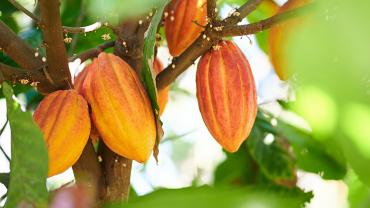
Cocoa (Theobroma cacao) contains a comparatively high amount of polyphenols. Polyphenols are a class of bioactive molecules that have been highlighted in recent research for their role in supporting many aspects of human health. Recent studies indicate that polyphenols derived from cocoa may support certain aspects of healthy aging. They may also support gut microbiome health.
Flavonoids are a type of polyphenol that are found in fruits, vegetables, tea, and cocoa. Flavonoids are categorized into groups such as flavanols and flavones based on their chemical structure. They have been shown to support many aspects of human health including the body’s response to oxidative stress. Other recent studies have linked flavonoids with neuronal health, cognitive function, and a healthy mood. Cocoa extracts have been a topic in recent research because of their relatively high flavanol content and their potential to support cardiovascular health. They have been shown to support the inflammatory response, platelet activation, and vascular health.
A randomized, double-blind, placebo-controlled clinical trial recently published by Sesso and colleagues explored the efficacy of supplementation with cocoa extract and multivitamins on outcomes related to cardiovascular disease. The trial, called the cocoa supplement and multivitamin outcomes study (COSMOS), involved daily supplementation with 500 mg of cocoa flavanols, including 80 mg of epicatechin. More than 20,000 individuals who were 60 years of age or older participated in this randomized trial with four arms: (1) cocoa extract plus a multivitamin, (2) cocoa extract plus a placebo, (3) multivitamin plus a placebo, and (4) all placebos. The median follow-up for this study was 3.6 years. Outcomes related to cardiovascular events, such as myocardial infarction, stroke, cardiovascular death, carotid artery disease, and unstable angina were assessed.
The authors conclude that supplementation with cocoa extract did not significantly reduce the total amount of cardiovascular events among older adults. However, when compared to a placebo, cocoa extract was shown to reduce the primary outcome of total cardiovascular events among compliant individuals. The authors also reported a 27% reduction in deaths related to cardiovascular disease in the population receiving cocoa extract. The cocoa extract was reported to be well-tolerated.
Study strengths include a large, randomized population and a relatively long period for the follow up. The limitations, as reported by the authors, include a wide range of cardiovascular outcomes and the inability to differentiate the effect of specific bioactive constituents within the extract.
Certain bioactive ingredients in cocoa, such as flavanols, have been shown to support human health. It is suggested by authors of the study (Sesso and colleagues) that these they ingredients may also help support certain aspects of cardiovascular health.
By Colleen Ambrose, ND, MAT